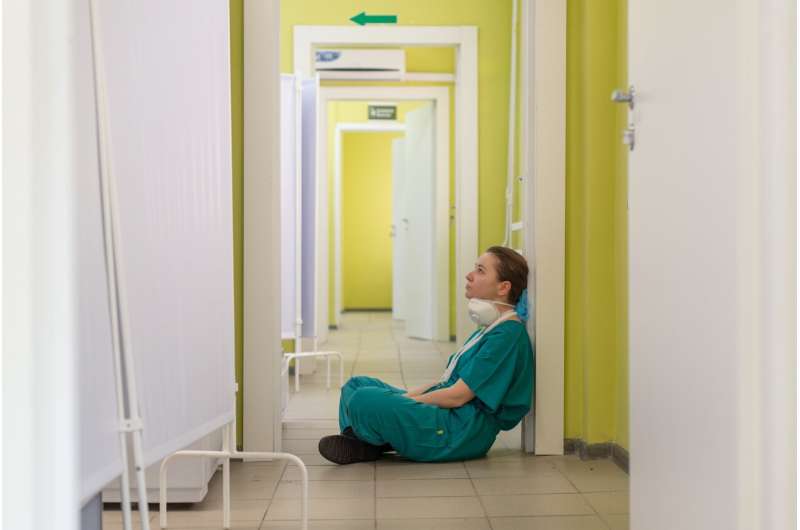Health care workers up to 3.3 times more likely to have experienced burnout during the COVID-19 pandemic


Health care professionals working during the coronavirus (COVID-19) pandemic are up to 3.3 times more likely to be burned out compared to non-health care professionals, despite the rates of mental health issues being similar, according to new research led by Queen Mary University of London.
The researchers behind the study are concerned if this burnout persists, we could see more mental health disorders and cases of cardiovascular diseases, such as strokes or coronary heart disease, among health care workers.
Published today in BJPsych Open, the study also shows that health care professionals who deal directly with patients are also more likely to be burned out compared to those who do not.
The study involved a series of online surveys assessing the rates of major depressive disorder, generalized anxiety disorder, insomnia, burnout, and low emotional well-being. The first survey was conducted in July–September 2020, the second six weeks later, and the final one being completed roughly four months later during the second U.K. national lockdown.
The most alarming finding was that health care professionals had a significantly elevated risk of burnout compared to non-health-care professionals during the second and third surveys. This difference in the risk of burnout appeared to increase over time: from 2.5-times to 3.3-times elevated risk.
The researchers speculate that while the COVID-19 pandemic has impacted the mental health of the entire population, higher workloads, longer hours, the stress of caring for patients, and anxiety around increased exposure to the virus meant health care professionals were placed under far greater stress than other people.
Dr. Ajay Gupta, study author and Senior Clinical Lecturer at Queen Mary and Honorary Consultant in Clinical Pharmacology and Cardiovascular Medicine, said, “We should all be worried about the disproportionately high rates of burnout in health care professionals, which may persist and lead to an even greater staffing and retention crisis for an already overburdened and underfunded NHS.
“It’s a problem that no-one seems to want to address, and we could be sleep-walking into a disaster unless we listen to our health care workers’ concerns and give them the support they need. Unless we can stop the burnout trend, we could see more mental health and physical consequences such as cardiovascular and metabolic diseases in our doctors, nurses, and other health care workers.”
Fiona Miller Smith, CEO of Barts Charity, said, “In the early days of the pandemic, it was incredibly clear to us at Barts Charity that we needed to shift some of our funding toward COVID impact relief. We hope these findings inform future policy on improvements to mental health care for all health care staff. Staff well-being is very important to us at Barts Charity and we are proud to be funders of this study.”
Source: Read Full Article